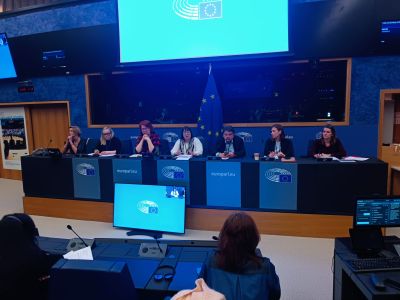The Trade Union Intergroup of the European Parliament – a cross-party group of Members of the European Parliament motivated by forwarding the interests of working people – held its first meeting since the EU elections today in Strasbourg.
The Trade Union Intergroup is co-chaired by MEPs Dennis Radtke (EPP), Estelle Ceulemans (S&D), Jana Toom (Renew Europe), Maria Ohisalo (Greens/EFA) and Leila Chaibi (Left), and is supported in its work by the European Trade Union Confederation. ETUC General Secretary Esther Lynch participated in the launch of the Intergroup.
The European Parliament has played and continues to play a key role in taking action to support working people. The Trade Union Intergroup provides an important forum for discussion between MEPs and trade union representatives.
During the discussion, the Co-Chairs of the Intergroup and the ETUC General Secretary stressed the importance of putting Social Europe and quality jobs at the centre of the discussion in the European Parliament and at EU level.
In the latest Eurobarometer survey, citizens stressed that they would like the Parliament to address “inflation, rising prices and the cost of living” and “the fight against poverty and social exclusion” as a priority.
Legislation and investments are needed to ensure quality jobs, and actions to support working people cannot be left on the back-burner, but must be brought forward with urgency.
During the discussion at the meeting of the Intergroup, various areas of action were raised to ensure quality jobs and improved working conditions.
Europe is undergoing a wave of restructuring. In this framework, it is a priority to defend quality jobs and to ensure just transition through anticipation and management of change.
At the same time, it is essential to guarantee that digitalisation benefits companies and workers alike: regulating AI in the workplace and ensuring the respect of the right to disconnect are essential steps.
Also, psychosocial risks must be prevented, in the framework of renewed efforts to ensure occupational health and safety.
Abuses in subcontracting chains and intermediaries must also be tackled, to ensure respect for workers’ rights and fair working conditions.
Finally, public money must contribute to creating quality jobs and promoting collective bargaining, including through better public procurement rules and social conditionalities in investments.
The Intergroup will deal with these and other matters in its next meetings, with the objective of creating a platform for a strong social Europe based on quality jobs and improved living and working conditions.

